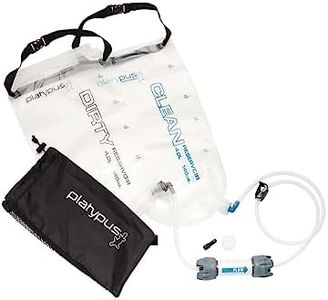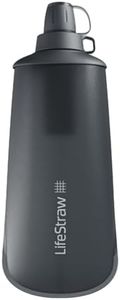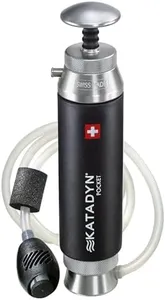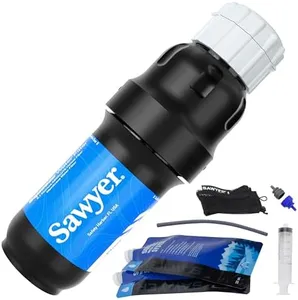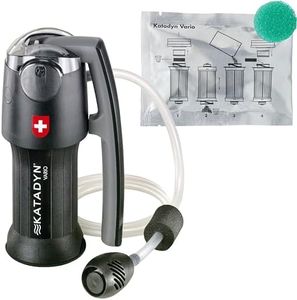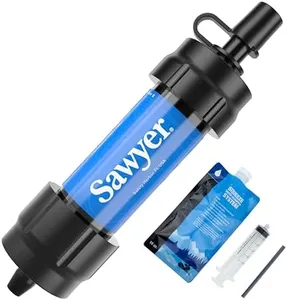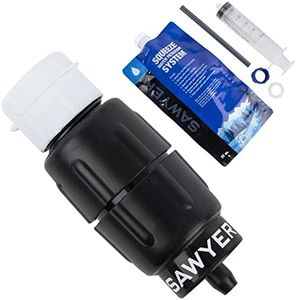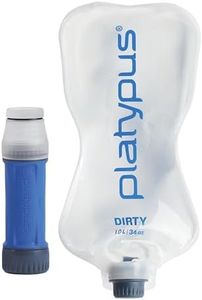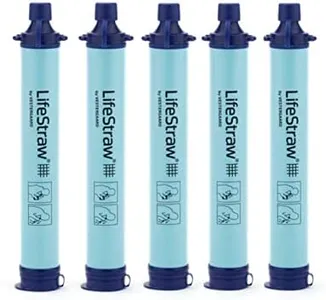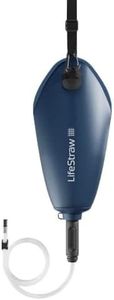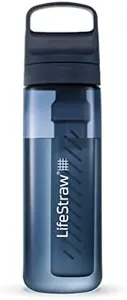We Use CookiesWe use cookies to enhance the security, performance,
functionality and for analytical and promotional activities. By continuing to browse this site you
are agreeing to our privacy policy
10 Best Camping Water Filters
From leading brands and best sellers available on the web.By clicking on a link to a third party's website, log data is shared with that third party.
Buying Guide for the Best Camping Water Filters
Choosing the right camping water filter is all about making sure you have safe, clean water wherever your adventures take you. Water sources in nature can look clean but might carry bacteria, parasites, or debris that can make you sick. Understanding how different filters work and which features suit your style of camping is the key to making a smart purchase. By taking the time to learn about the main specifications, you’ll be able to confidently pick a water filter that keeps you healthy and meets your needs.Filter TypeFilter type refers to the technology the filter uses to clean water—common types include pump filters, gravity filters, squeeze filters, and straw-style filters. This is crucial because each type has different ways of removing impurities and can affect how easy or quick it is to get drinking water. Pump filters are good for controlled filtration and are great for groups but can be a bit bulky. Gravity filters are excellent for large amounts with minimal effort but may take longer to process water. Squeeze and straw filters are lightweight and simple, ideal for solo hikers or emergencies, but may not be suited for filtering a lot of water at once. Choose a filter type that fits your group size, how much time you want to spend filtering, and your preferred level of convenience.
Filtration Level (Micron Rating)The micron rating, often noted in microns (such as 0.1 or 0.2 micron), tells you how small the particles are that the filter can remove from the water. This matters because the smaller the micron rating, the more bacteria and protozoa the filter can block, making your water safer. Filters around 0.1–0.2 microns are very effective against most waterborne bacteria and protozoa but won't remove viruses. If you're camping in North America or places where viruses aren't common in water, this is typically enough. For international travel where viruses might be present, consider using extra treatment like chemical purifiers.
CapacityCapacity describes how much water the filter can clean at one time or over its entire lifetime. For one-person, short trips, a small-capacity filter works fine, but groups or longer journeys benefit from a filter that can handle more water efficiently. Some filters process water immediately by the liter or cup, while others, like gravity filters, can clean several liters at once—perfect for families or group campsites. Consider your group's size and trip length to choose a filter that won’t slow you down.
Weight & PortabilityWeight and portability are about how easy it is to carry your filter while backpacking or hiking. Lightweight filters are best for solo trekkers or those counting every ounce, while larger options can be worth carrying for groups who need to filter lots of water, especially if they’re set up at a base camp. Decide if you need something ultra-light and compact, or if you can manage a bit more weight for a filter with higher capacity and ease of use.
Ease of UseEase of use covers how simple the filter is to operate, maintain, and clean in the field. Filters that require lots of pumping, setup, or back-flushing may be slower or more fiddly but can offer thorough filtration. Others might be as simple as filling a bag or using a straw and drinking directly from the source. Think about how patient and handy you are with gear—pick a filter that matches your comfort with setup and maintenance, especially if you need quick, hassle-free access to clean water.
Longevity & MaintenanceLongevity refers to how long a filter will last before parts need replacing, and maintenance is about what you must do to keep it working well. Some can filter thousands of liters before a replacement, while others have lower thresholds. Filters needing frequent cleaning or cartridge swaps may be less convenient for extended trips. If you expect to use your filter often or on extended adventures, choose one that is durable, easy to maintain, and has widely available replacement parts.
